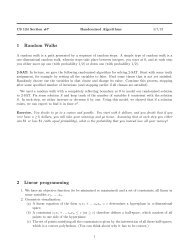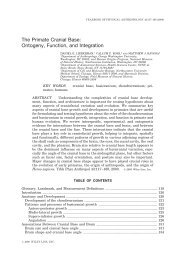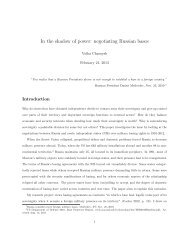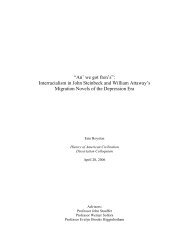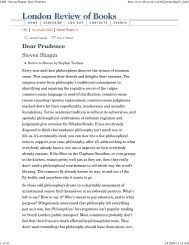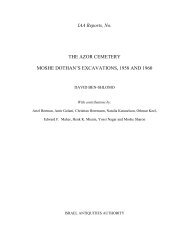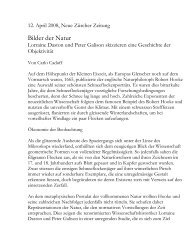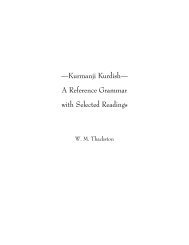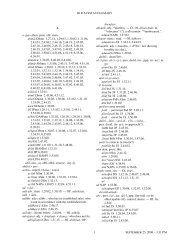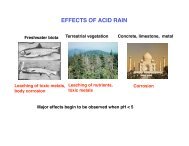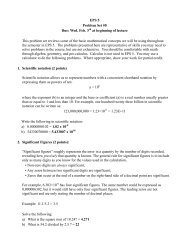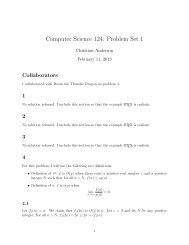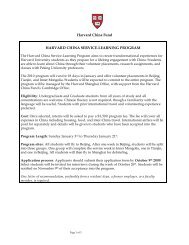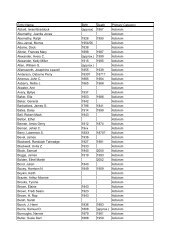—Kurmanji Kurdish— A Reference Grammar with Selected Readings
—Kurmanji Kurdish— A Reference Grammar with Selected Readings
—Kurmanji Kurdish— A Reference Grammar with Selected Readings
You also want an ePaper? Increase the reach of your titles
YUMPU automatically turns print PDFs into web optimized ePapers that Google loves.
Wê rojê, germa havînê tu gêj kiribûyî. On that day the heat of summer had<br />
made you dizzy.<br />
Bi fikira ku belkî mêrik li hemberî<br />
polîsan rabe û tiştekî bi kar bîne,<br />
polîsekî demanca xwe jî kişandibû.<br />
Thinking that the man might resist the<br />
police and use something [as a weapon],<br />
a policeman had drawn his pistol.<br />
As in Persian, the past perfect tense in Kurmanji is not necessarily tied to<br />
a temporal reference as it is in English. It is often used independently for a<br />
past tense <strong>with</strong> a somewhat more remote signification where English would<br />
have a simple past, particularly in narratives.<br />
Gava min di hevpeyvîneke bi Osman<br />
Sebrî re, pirsa ku wî “kengî dest bi<br />
nivîsandinê kiriye” kiribû, wî gotibû<br />
ku …<br />
Tu heta niha li ku bûî? —Ez bîskê<br />
çûbûm mala Ehmed. Ji wir jî em çûn<br />
komelê.<br />
THE VERB<br />
When, during a conversation <strong>with</strong> Osman<br />
Sebrî, I asked (not “had asked”)<br />
when he had started writing, he said<br />
(not “had said”) that … 1<br />
Where have you been till now? —I went<br />
to Ahmad’s house for a bit. From there<br />
we went to the society. 2<br />
§ 21.2. The Past Perfect Tense of Karîn and Zanîn. The past perfect form<br />
of the verbs karîn ‘to be able’ and zanîn ‘to know’ is used as the normal<br />
past tense. Thus ez/min dikaribûm means ‘I was able, I could,’ and min<br />
dizanibû means ‘I knew.’ As in the present tense, the negatives of these<br />
verbs are formed <strong>with</strong> ni-, as in ez/min nikaribûm ‘I wasn’t able, I<br />
couldn’t’ and min nizanibû ‘I didn’t know.’ Negatives <strong>with</strong> di- (past perfect<br />
progressive) are nedi-. Complements of the past perfect of karîn are<br />
either in the present subjunctive or in the past conditional (see §25.1 below).<br />
For sequence of tenses in clauses following the past perfect of zanîn,<br />
1<br />
In this example, both Persian and Turkish might very well have the past perfect<br />
tense in both positions ( مدﻮ $ ﺑ هﺪ$<br />
ﻴﺳ $ ﺮ$<br />
ﭘ,<br />
sormuştum and دﻮ $ ﺑ ﻪ$<br />
ﺘﻔﮔ $ $ , demişti) to imply that<br />
significant time has passed since the exchange occurred. Since the example is <strong>with</strong>out<br />
a secondary time reference, English would not use the past perfect.<br />
2<br />
Here the first verb is in the past perfect because the speaker wants to convey that<br />
he had gone to Ahmad’s house before he and the others went somewhere else.<br />
57



